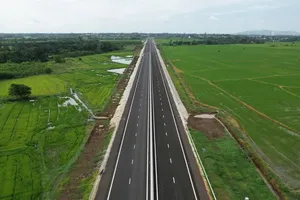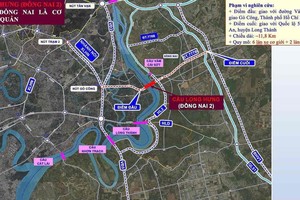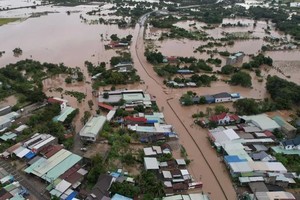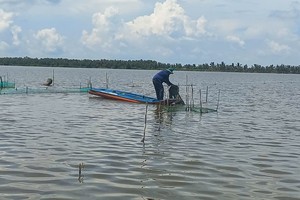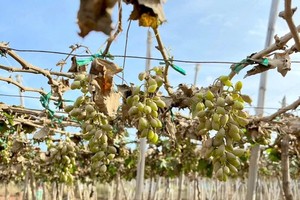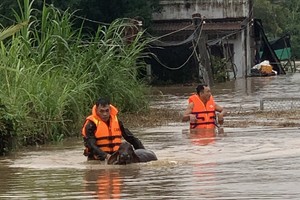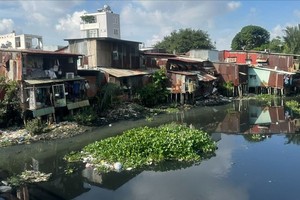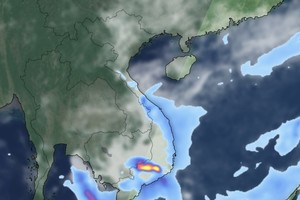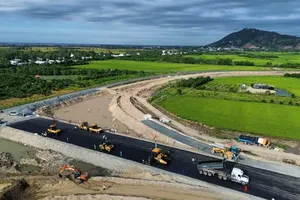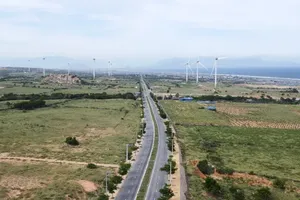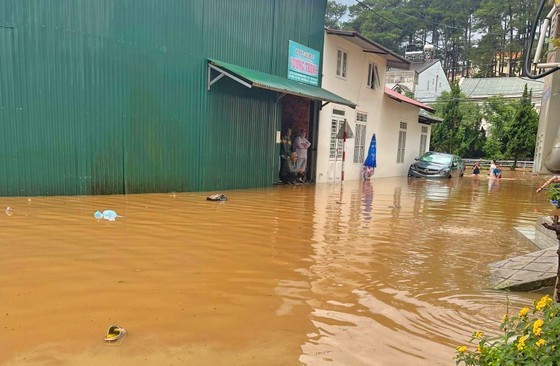 |
The street inside Hoang Dieu residential area (Ward 5 of Da Lat City) are deeply flooded after a recent heavy rain |
After the one-hour downpour on June 23, Da Lat City saw serious flooding, especially the streets in Da Lat Golf Valley area, Tran Quoc Toan Street in Ward 2, Cach Mang Thang Tam Street in Ward 8, and the neighborhoods of Cam Ly stream, Ha Dong stream, Da Thien stream, and Quang Trung stream. Different kinds of assets of local dwellers were deep under the water, while landslides occurred in certain neighborhoods and the local authorities had to urgently move them to safer locations.
100km away from Da Lat City, Bao Loc City shared the same story after the heavy rain on June 25, lasting more than an hour. Many streets like Ha Giang, Le Hong Phong (Ward 1), Le Van Tam, Ky Con, Nguyen Cong Tru, Huynh Thuc Khac (Ward 2) were full of rainwater. 34 sites are reported to have a high potential of urban flooding, mostly in Ward 1, Ward 2, Loc Son Ward, B’Lao Ward, and Dai Lao Commune, Loc Chau Commune.
The Natural Disaster Prevention – Search and Rescue Commanding Committee explained that this has happened because of torrential rain in a short time, leading to the inability for rainwater to run off and local flooding.
However, the subject reason comes from the disobedience of ground leveling principles during construction. Instead of respecting the natural features and minimizing excavation, following urban drainage requirements, many building projects have not stuck to initially planning.
For instance, in the neighborhood of Yersin stream (Ward 9 of Da Lat City), the drainage corridor system has been severely encroached. Hundreds of meters of the stream’s surface are covered with concrete, brutally limiting the drainage ability.
Similarly, in Da Lat Golf Valley area, there used to be a small stream playing the role of water runoff route. When the stream was filled and the vegetable farms were transformed into villas, the concrete surface area has greatly increased, unable to meet the drainage demands here.
Chairman of Lam Dong Province People’s Committee has already sent an urgent dispatch asking related state units in local areas to immediately clean drains, ditches, canals, streams, and drainage works, especially in residential areas and lowland areas, in order to eliminate water flow congestion that might create urban flooding.
Planning experts commented that urbanization and forced changes in natural water flows have negatively influenced Da Lat City and Bao Loc City, while the outdated drainage system cannot satisfy the growing demands of rainwater runoff. Adding to that is a rise in greenhouse surface area, making water rush to low areas to create flooding.
Researcher Nguyen Mong Sinh, who has spent over 40 years studying Da Lat City, proposed that it is necessary to maintain an ecological balance between natural lakes and artificial reservoirs for more effective drainage functions. It is also essential to replan vegetable, flower growing and agricultural production zones, as well as to relocate greenhouse in the city heart to the outskirt.
Architect Nguyen Truong Luu, Chairman of the HCMC Architects Association, said that Da Lat City has been continuously flooded after heavy rain for many years. The main reason is that urban planning has been unsuccessful in calculating drainage amount. Therefore, water runoff on the surface flows to a few low areas and creates flooding. Hence, each location needs its own specific drainage system to suit its nature.


